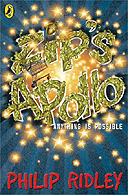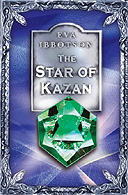It is extraordinary to think that not so long ago a child described as a "bookworm" was assumed to have a problem. "Take your head out of that book," was the caring parent's command, "and get outside while the sun's shining." As soon as parents saw their children seduced from books by the lure of the dreaded TV, though, the tune changed. Of course, television wasn't all bad - but bookish parents wrung their hands all the same and looked back nostalgically to the hours they had spent hardly breathing with excitement as they left this world for another, mysteriously conjured up by print on page.
So when the JK Rowling phenomenon hit the bookshops, followed by Philip Pullman and others, many parents heaved a huge sigh of relief. Every queue outside a bookshop proved something astonishing: children could read, after all. No more talk of bookworms: the torch under the bedclothes became something for parents to boast about, not to forbid. Six hundred pages in a week? Nothing for a child trying to uncover the next Voldemort atrocity. So is this a happy ending? Children hooked on books again and parents off the hook?
It all depends on the next stage in the reading lives of those hooked readers. My generation of children discovered books from a combination of parental recommendation, reading lists at school and visits to the library, which were then a much more positive force than they are now. But there was no aggressive marketing to switch us in the direction of a particular book. Finding a book was an adventure that involved real choice.
The result was that we humble bookworms read widely, with a catholic lack of discrimination, and only gradually discovered what we enjoyed. By the age of 12, I veered between Streatfield, Nesbitt, Goudge, Trease, Macdonald Fraser, Heyer and absurd romantic fiction. I also read for the first time the adult classics which, over the years following, became old friends: Austen, Brontë, Dickens, Kipling and Hardy, followed soon by Lehman, Waugh and Hemingway.
Children, when they are allowed to be, are extraordinarily open-minded, prepared to read anything, however unlikely, if it grabs their imagination. At a celebration of childhood reading next week, organised by PEN, Harold Pinter will reveal that his favourite book as a child was Ulysses: an unusual choice, although Joyce's dialogue links closely with some of Pinter's own writing. Apparently, Pinter bought his copy of Ulysses in 1943, when he was 13. He had, he says, no money whatsoever but, when he had his bar mitzvah, kind aunts and uncles gave him some cash, as was customary, and he went straight out to buy Ulysses. Doris Lessing, another big name at next week's event, will choose The Jungle Book. She explains that she was brought up surrounded by animals, so the storyline was not as strange to her as it might have been to a child in England. Jung Chang, author of Wild Swans, who will also attend the PEN event, will talk about Hans Christian Andersen: as a child in the 1950s in Mao's China, she says, Andersen was one of the few children's writers allowed, because he was deemed to have "exposed the dangers of the capitalist world". "I grew up thinking all western children led a life like the Little Match Girl," she says.
The question for modern parents is how to build on the popularity of a smallish range of exceedingly popular contemporary children's books and lead their goggle-eyed offspring to wider shores. When I was 13, my mother took us to do a bit of reading in appropriate locations. She chose Wales and the site where Wordsworth stood as he composed "Lines written above Tintern Abbey". Our protests at being forced to cross a field surrounded by barbed wire and filled with fierce bullocks were to no avail. She herded her five youngest children into a group and, with the rain pouring down, I was instructed to read the poem.
I don't suggest that this was the most successful experiment, but it did impress me deeply, at the time, of the hardships endured by a writer and maybe convinced me that I should be a novelist, and not a poet. Nowadays, with an increasing amount of houses or other locations associated with writers open to the public, there are easier choices. A friend whose daughter had fallen in love with Jane Eyre organised a summer expedition in Yorkshire with a trip to Haworth, where the tragedy and romance of the Brontë sisters' story excited her daughter to read more of their novels.
Jane Austen's house, so different but equally filled with the personality of the author, is another possibility in the south of England. It really is inspiring to see the actual desk at which Elizabeth Bennett and Mr Darcy were created. My own passion for Thomas Hardy induced my husband and I to buy a house in Dorset. Thirty years later, I still love to lead my children in the footsteps of poor Tess d'Urberville.
There are less active ways to encourage the reluctant reader. One reason why I read so much as a child was that, during the long holidays, there was very little else to do. I don't suggest parents cancel their holidays in the sun, but the over-entertained child is unlikely to open a book. The suggestion, "Let's have a day at home doing nothing", may not sound very alluring but it's extraordinary how reassuring it can be - and, with a bit of gentle prodding, how many opportunities to read it can open up.
As always, the most successful option is example. A child who sees his or her parents picking up a book with obvious enjoyment will most likely follow suit. And film adaptations are another way for parents and children to share the pleasures of a book - on balance, a happy experience in the cinema leads children to the book version, although the minority report suggests the immediate appeal of the visual can make the printed page seem unduly difficult.
Finally, it's important to clock a child's personal preferences - which may well not be your own. As I have said, children's tastes can be surprising. My eldest son, for a long time an obdurate non-reader, surprised us one holiday by reading the entire collection of PG Wodehouse, followed immediately by the science-fiction of Asimov. In a neat reversal of the mother-son roles, I ended up reading both authors for the first time and thoroughly enjoying them - well, to be honest, I found Asimov rather hard going. But that's probably what my son thought about Thomas Hardy.
· © Rachel Billington.
Books that shaped our future
Jacqueline Wilson, children's author
Jane Eyre by Charlotte Brontë
This was the first grown-up classic I read, at about the age of 10. Part of its appeal was that - like a lot of Dickens novels - it opens with the main character as a child. As I grew up, I re-read it several times, and I found myself concentrating on different parts - at first, on the very early years when Jane is 10 or 11, and then, as I grew older, on her teenage years and her relationship with Edward Rochester.
At secondary school we read it in class, and I was by this time so passionate about the book that my teacher let me read it out loud in front of the class. A bit later I went to Haworth for the first time and loved the whole experience of seeing the place where the Brontës grew up; later still, I saw the original manuscript.
I still re-read Jane Eyre every five years or so, and it still speaks to me as it does to so many women. What I particularly like is that the heroine is such an ordinary girl - she isn't pretty, she isn't gifted or particularly witty, but what she has got is this spark, this independence of mind.
Tom Stoppard, playwright
England, Their England by AG MacDonell
I was 15 when I read England, Their England. The only well-known part of it is the bit about the village cricket match - but it had a big influence on me, and a bad influence. The bad influence was that a few years later, when I had my own column on a local paper, my idea was to be indefatigably facetious. I liked to think I was writing in the style of England, Their England, but I wasn't really. But the book made me try to write in this way - and I'm not entirely sure I've ever shaken it off...
Part of its appeal, I'm sure, was that it dealt with what England was like, and I had grown up in India until the age of eight - the whole book evokes an England that had already disappeared by the time I read it, but its ghost was still around and I was very much taken by it.
Bonnie Greer, writer
Another Country by James Baldwin
I was about 11 when I read this book: I've no idea how I came by it, and as it is an adult book with lots of sex and drug-taking, I'm sure it wouldn't have been approved of - it was very much a case of reading it under the covers.
It made a huge impression on me: I was growing up against the backdrop of the human rights movement, and here was a novel that was about love across all these divides - race, class and so on. It made me realise that I didn't have to follow the future that was mapped out for me - getting married, living in the suburbs - but that I could have a much less conventional life.
I found out that Baldwin went to live in Paris the same week I was born, which seemed a kind of link between us, and I did eventually go on to meet him, which affected me very profoundly.
· Personal Wonderlands is at the Bloomberg Auditorium, Finsbury Square, London EC2, on Tuesday November 25. For more information, please call English PEN on 020-7713 0023, or visit www.englishpen.org/readersandwriters

